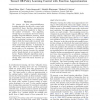46 search results - page 7 / 10 » Measuring and Optimizing Behavioral Complexity for Evolution... |
ICML
2010
IEEE
13 years 8 months ago
2010
IEEE
We present the first temporal-difference learning algorithm for off-policy control with unrestricted linear function approximation whose per-time-step complexity is linear in the ...
ATAL
2004
Springer
14 years 1 months ago
2004
Springer
Multi-agent research often borrows from biology, where remarkable examples of collective intelligence may be found. One interesting example is ant colonies’ use of pheromones as...
SMC
2007
IEEE
14 years 2 months ago
2007
IEEE
—Reinforcement learning is a framework in which an agent can learn behavior without knowledge on a task or an environment by exploration and exploitation. Striking a balance betw...
IROS
2007
IEEE
14 years 2 months ago
2007
IEEE
— While underactuated robotic systems are capable of energy efficient and rapid dynamic behavior, we still do not fully understand how body dynamics can be actively used for ada...
ATAL
2009
Springer
14 years 2 months ago
2009
Springer
In this paper, we study multi-agent economic systems using a recent approach to economic modeling called Agent-based Computational Economics (ACE): the application of the Complex ...

